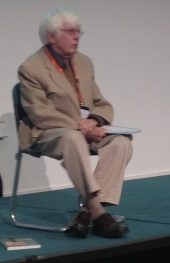 The SOLWorld 2012 conference in Oxford was a roaring success. Alongside all the anticipated pleasures of meeting old and new friends, hearing about new developments and having a great time, there was one unexpected, though very welcome feature. I was delighted to see Professor Rom Harré at the conference, invited by the organisers to do an Open Space.
The SOLWorld 2012 conference in Oxford was a roaring success. Alongside all the anticipated pleasures of meeting old and new friends, hearing about new developments and having a great time, there was one unexpected, though very welcome feature. I was delighted to see Professor Rom Harré at the conference, invited by the organisers to do an Open Space.
Rom is an academic legend, in his 80s and still questing for better ways to look at psychology. He is a professor at both Oxford and Georgetown, Washington DC, and was until recently director of the Centre for Philosophy of Natural and Social Science at the London School of Economics. His work has been groundbreaking – a career looking at both Wittgenstein AND science through very skillful lenses. During his well-attended session, he spoke about pronouns and how, for example, the languages with two second-person pronouns (like the French tu and vous) led to different interactions and ways of living which we English don’t have. This reflects a great interest in the ways language builds our lives as well as describes them.
Rom’s new book Psychology for the Third Millennium: Integrating Cultural and Neuroscience Perspectives (http://www.amazon.co.uk/Psychology-Third-Millennium-Neuroscience-Perspectives/dp/toc/0857022695) is outstanding – a very readable way of linking the ‘molecules’ of neuroscience with the ‘meanings’ of construction and interaction without falling down the hole in the middle that is conventional psychology – positive or otherwise.
Rom is a member of the InterAction editorial advisory board and told me at Oxford that he views himself as a ‘member of this thing’ (gesturing around at the SOL 2012 people). What WE have is loads of experience, data and results that back up the kinds of things that HE is saying. He is starting to see that (I think/hope). My hope is that by forging alliances with people like Rom, Daniele Moyal-Sharrock and other respected academics who are on a similar track, we can present SF as the practical end of a new movement – one which places respect, curiosity and trust ahead of dubiously-generated knowledge with which to tell people how they are, rather than to help them to live better in whatever way they wish – yet one which has a proper (albeit somewhat unexpected) scientific underpinning.
is a member of the InterAction editorial advisory board and told me at Oxford that he views himself as a ‘member of this thing’ (gesturing around at the SOL 2012 people). What WE have is loads of experience, data and results that back up the kinds of things that HE is saying. He is starting to see that (I think/hope). My hope is that by forging alliances with people like Rom, Daniele Moyal-Sharrock and other respected academics who are on a similar track, we can present SF as the practical end of a new movement – one which places respect, curiosity and trust ahead of dubiously-generated knowledge with which to tell people how they are, rather than to help them to live better in whatever way they wish – yet one which has a proper (albeit somewhat unexpected) scientific underpinning.
In taking the both-and path – taking social/culural/language seriously (which most scientists don’t) and also taking ‘hard’ sciences like neurosciences seriously (which most social constructionists don’t), Rom Harré is a great example. I draw great inspiration from his work and his continuing energy.
Hi Mark
Thanks for your note and it’s fabulous that he was willing and able to attend. Keep up the hard work re linking to Academics/Universities 🙂